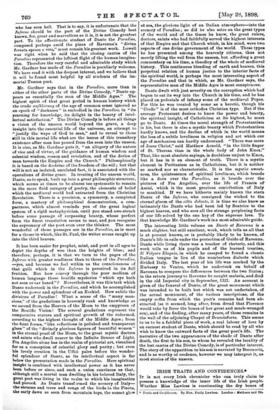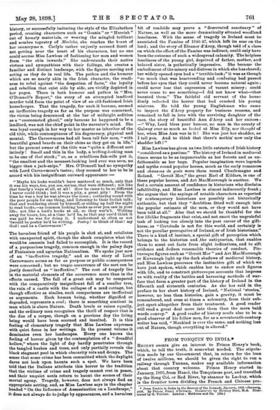IRISH TRAITS AND CONFIDENCES.*
Ix is not every Irish chronicler who can truly claim to possess a knowledge of the inner life of the Irish people. Whether Miss Lawless is reanimating the dry bones of • Traits and Confidences. By Hon. Emily Lawless. London: Methuen and Om
history, or successfully imitating the style of the Elizabethan period, creating characters such as " Grania" or " Hurrish " out of homely materials, or weaving the mingled brilliant
and sombre tapestry of Maelcho, she reaches the lic.,art of her conntryme n. Carlyle rather unjustly accused Scott of
not getting near the heart of his characters, but no one could accuse Miss Lawless of fashioning her men and women from "the skin inwards." She understands their native virtues and sympathises with their failings, she creates a familiar and distinct landscape, with the figures moving and acting as they do in real life. The pathos and the humour which are so nearly akin in the Irish character, the readi- ness to rebel against "the despotism of facts," the loyalty and rebellion that exist side by side, are vividly depicted in her pages. There is both humour and pathos in "Mrs.
O'Donnell's Report," the story of an attempted landlord murder told from the point of view of an old-fashioned Irish housekeeper. That the tragedy, for such it became, seemed an ineffective tragedy as far as the purpose was concerned, the victim being denounced at the bar of midnight sedition as a " coorooneted ghoul," only because he happened to be a landlord, was not the chief point in the narrator's mind. She was loyal enough in her way to her master as inheritor of the old title, while contemptuous of his degeneracy, physical and mental. The Carrowmores had all been tall fair men, "with beautiful grand beards on their chins as they got on in life," but the present owner of the title was "quite a different sort intirely ! Small and thin in the body, a trifling-looking man
to be one of that stock ; " or, as a rebellious fish-wife put it, "the smallest and the meanest-looking lord ever was seen, no bigger than a jack-snipe." Mrs. O'Donnell had no sympathy
with Lord Carrowmore's tastes ; they seemed to her to be in accord with his insignificant outward appearance :—
"Maybe his looks wouldn't have mattered so much, only that it was his ways, too, you see, ma'am, that were different; not like that family's ways at all, at all ! How he came to be so different I never could think ; but it was a pity, a great pity ! From the time he was a boy he was always the same ; coshering round with the poor people for one thing, and listening to their foolish talk; that and wandering about by himself, or sitting up half the night to read books,—as common looking books as ever you saw in your life ; not like a lord's books at all, so they wer'n't. Writing away for hours, too, at a time he'd be, so that any one'd think it was paid he was for doing it. I understand as often as not 'twould be poetry he'd be writing. Poetry ! to think of that! my God ! and be a Carrowmore!"
The harmless friend of his people is shot at, and retaliates with unexpected spirit, though the shock completes what the would-be assassin had failed to accomplish. It is the record of a purposeless tragedy, common enough in the palmy days of Fenianism and agrarian Nationalism. We spoke just now of an "ineffective tragedy," and so the story of Lord Carrowmore seems as far as purpose or public consequences were concerned ; but no tragic occurrence of the sort can be justly described as " ineffective." The root of tragedy lies in the material elements of the occurrence more than in the effects caused. The fall of a great oak may be compared with the comparatively insignificant fall of a smaller tree, the ruin of a castle with the collapse of a mud cottage, but though effective as situiles, such comparisons are ineffectual
as arguments. Each human being, whether dignified or degraded, represents a soul; there is something sentient in
man which is above Nature. Death levels or raises equally, and the ordinary man recognises the thrill of respect that is the due of a corpse, though on a previous day the living being would have been scorned and insulted. It is this feeling of elementary tragedy that Miss Lawless expresses with quiet force in her writings. In the present volume it dominates even her landscapes. Every one knows the feeling of horror given by the contemplation of a "dreadful hollow," where the light of day hardly penetrates through the tangled bushes and trees, and only partially reveals the black stagnant pool in which obscurity rots and decays. The sense that some crime has been committed which the daylight dares not look upon haunts such a spot. We have been told that the Italians attribute this horror to the tradition that the victims of crime and tragedy cannot rest in peace, and their unquiet souls return to haunt the scenes of their mortal agony. Tragedy, however, does not always find an appropriate setting, and, as Miss Lawless says in the chapter beaded "On the Influence of Assassination on a Landscape," it does not always do to judge by appearances, and a harmless
bit of roadside may prove a "desecrated sanctuary" of Nature, as well as the more dramatically situated woodland loneliness. With the sense of tragedy in Ireland must be associated the Famine of 1846.47, which left its scar on the land ; and the story of Eleanor d'Arcy, though told of a class on which the effect of the Famine was indirect, could only have been the outcome of such a widespread calamity. The helpless loneliness of the young girl, deprived of father, mother, and beloved sister, is pathetically impressive. She became the embodiment of the misery and distress in which she has shared; her widely opened eyes had a "terrible look;" it was as though "so much that was heartrending and confusing had passed before her eyes that they could never become natural again ; could never lose that expression of vacant misery ; could never cease to see something—I did not know what—that haunted them." The faithful old servant of the honse dimly reflected the horror that had crushed his young mistress. He told the young Englishman who came to inspect the d'Arcy property for business reasons, and remained to fall in love with the surviving daughter of the race, the story of beautiful Ann d'Arcy and her suitors: —" Why, Lord bless your honour, no man in the county of Galway ever so much as looked at Miss Elly, nor thought of her, when Miss Ann was in it ! She was just her shadder, as I tell you. And to think that there's nothin' now only the shadder left !"
Miss Lawless has given us two little extracts of Irish history' "considered as a pastime." The history of Ireland in media3val times seems to be as impenetrable as her forests and as un- fathomable as her bogs. Popular imagination wove legends and myths round popular heroes, much as the early romances and chansons de geste wove them round Charlemagne and Roland. " Geroit Mor," the great Earl of Kildare, is one of these popular heroes, and Art MacMurrough is another. We feel a certain amount of confidence in historians who disclaim infallibility, and Miss Lawless is almost indiscreetly frank ; she argues that the sayings of notable characters as reported by contemporary historians are possibly not historically authentic, but that they "doubtless fitted well enough into the popular estimate of the men, or they would not have been told at all." Also that we should be thankful for the few lifelike fragments that exist, and not enact the ungrateful task of looking too closely into the past career of the gift- horse, as "Certitude is not for this world, and certainly is not the peculiar prerogative of Ireland, or of Irish historians." There is a kind of instinct, a special gift of perception which belongs to the historian and the antiquarian, that enables them to scent out facts from slight indications, and to sift evidence and deduce reasonable theories of conduct. Pic- turesque figures such as " Geroit Mor " and Art MacMurrough or Kavanagh light up the dark shadows of mediieval history, and Miss Lawless possesses the instinctive gift of which we have just spoken, which enables her to endow such Sguree with life, and to construct picturesque accounts that impress us with reality of the battles and harassing methods of war- fare that form a greater part of the history of Ireland in the fifteenth and sixteenth centuries. As she has said in the preface to her short history of Ireland, "National 'stories,' however, no less than histories, gain a gravity, it must be remembered, and even at times a solemnity, from their sub- ject apart altogether from their treatment. A good reader will read a great deal more into them than the mere bald words convey." A good reader of history needs also to be tu. good observer of his fellow men, for as a seventeenth-century writer has said, "Mankind is ever the same, and nothing lost out of Nature, though everything is altered."



































 Previous page
Previous page